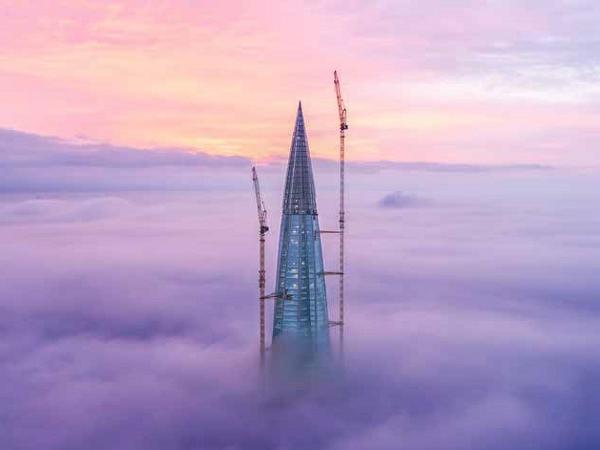
Date: 20 December 2018
Resembling a needle, Europe’s tallest building spirals 462 meters into the sky. The ,Star of St. Petersburg‛, as the building is already being called, occupies a 170,000 m² footprint on the shores of the Gulf of Finland in the Primorsky District, some 10 km northwest of St. Petersburg’s city center. Designed by the RMJM partnership under Tony Kettle’s direction, the project was managed by ZAO Gorprojekt; and the work planned by Samsung Production.
As a modern business center with many public functions, the building is intended to form the hub of a new downtown and take the strain off the historic city center. The high-rise will serve as the new headquarters of Russian gas producer Gazprom, which is also the client, but on completion, there will also be, among other things, a sports facility, a planetarium, a restaurant, and an amphitheater, where aquatic shows will be staged.

ver 3,000 people are involved in the construction proper, with some 600 Russian and international companies and over 20,000 people from 18 countries involved in the project’s full realization. Construction got underway in 2012 and completion is scheduled for the end of 2018.
Anyone who closely followed the 2018 World Cup in Russia had the opportunity to admire the new Lakhta Tower due to its proximity to the St. Petersburg World Cup stadium, with the city’s new landmark being captured by the cameras of the world’s broadcasting stations time and again.
Only shortly before the start of the World Cup did the fitters from façade constructor Gartner − aided by roped industrial climbers − install the last of the 3 x 4 m glass panes at heights of over 300 m, without helicopter assistance. This oversized needle, with its curved glass façade, now stands majestically over the Gulf of Finland, welcoming approaching cruise ships from afar.

Image © Kamil Nureev
Glass atriums, each two storeys high on all five exterior sides, can be naturally ventilated and, coupled to other energy-saving technologies, make the tower a truly ‚green building‛, with a LEED Gold label being envisaged. The highly thermally insulated façade, its improved use of daylight – thanks to panoramic glazing − and natural ventilation play key roles in this respect. The Lakhta Center is already one of the world’s tallest buildings capable of being naturally ventilated.
Trosifol™ partner Josef Gartner GmbH in Gundelfingen in southern Germany installed the 100,000 m² façade − equivalent to the size of about 14 soccer fields and thus larger than the playing areas of all Russian World Cup stadia put together.
For this, Gartner produced some 16,600 individual elements of steel, aluminum, and cold-bent glass, all with different weights − up to 700 kg − and of different sizes. Since no two storeys are the same in this spiral skyscraper, the engineers had to calculate different dimensions for almost every element.

Image © Rainer Hardtke
Façade of Cold-Bent Glass
The large rhomboid façade elements give the skyscraper a high degree of transparency. On the lower floors, the façade, with its 2.8 x 4.2 m elements, leans outward, but leans inward on its upper floors.
The individual elements with up to 8 cm thick stainless steel panels were prefabricated in Gundelfingen, Gartner’s headquarters. These shaped panels were cut by laser and water jet and welded and bolted together into complex units.
The 7.6 m-long upper spire of the tower weighing some 10 t and the 5.3 m long lower spire were each transported by truck in oversized consignments to St. Petersburg. The architects call this part the tip of the ,helmet‛, the helmet itself being the building’s topmost 100 meters.
The dynamic and slender shape of the new skyscraper has its origin in its geometry. The tower is at its widest in the middle and then tapers upwards to a point, with each of the 110 floors being a different size. The ground plan is based on five wings arranged around a circular core.
The floor slabs of the tower are twisted by an offset of 0.82 degrees in relation to one another. All the same, with its 163,000 m² of gross floor space, it seems to spiral smoothly and elegantly skywards. This effect is made possible by the façade of cold-bent glass that is bent by up to 40 mm. Unlike the other prefabricated façade elements, these glass panes had to be pressed from outside into their curved aluminum frames.
The Lakhta Tower makes use of two different solar protection glasses: firstly, highly reflective glass from AGC with a Stopray vision 72 CT coating and, secondly, Cool Lite SKN 176 II-coated, highly transparent glass from Saint Gobain, both of which feature high light transmittance and transparency despite high exterior reflection. For the glass construction, an 8 mm glass was chosen for the inside and a 2 x 8 mm glass sandwich − separated by a 1.52 mm thick PVB film for the outside. Between the two glass constructions is a 16 mm cavity filled with argon.
For the PVB film, the client relied largely on Trosifol® UltraClear: “On the basis of our analysis findings, we can recommend the use of glass with PVB. The PVB interlayer provides a better distribution of tension between the glass panes and an up to 16% higher capacity span for the thermally conductive outer layers,” explains façade manufacturer Gartner in its presentation to the site.
Trosifol® UltraClear is a highly transparent PVB film with very high adhesion and long-term strength, making it ideal for use in laminated safety glass in architectural glazing, as demonstrated in many highprofile applications across the globe. It is recommended particularly for laminated safety glass made up of fully tempered glass or heat-strengthened glass.
In addition to its strength, it also contains a highly effective UV stabilizer, delivering what is probably the world’s lowest yellowing value. In multiple laminates in particular, this results in a visible and measurable improvement in optical glass quality and was also an important factor on the Lakhta Tower.
The laminated safety glass was laminated by Trosifol™ customer Eckelt Glas GmbH in Austria.
Another Trosifol® product, SentryGlas® ionoplast film, was used in the 16.5 m long glass fins made by sedak in Gersthofen, southern Germany. For this purpose, sedak invested in a new oven with a new combustion technology regarded by the manufacturer as a technical and economic milestone for the toughening of coated panes up to 16.5 m.
The SentryGlas® interlayer from the Trosifol® construction product family is five times stronger and up to 100 times stiffer than conventional film/laminate materials. Thanks to this strength, the glass is capable of playing a prominent role as a construction material on the building envelope, as it opens up design scope that didn’t previously exist. For this reason SentryGlas® was selected for the glass fins on the Lakhta Tower that, anchored on the floor, serve effectively as columns supporting the entrance area and the terrace of the higher ground floor.
Along with its strength, the SentryGlas® ionoplast interlayer also maintains high transparency, even after years of use. Unlike other interlayers, the SentryGlas® ionoplast interlayer is much less sensitive to moisture over the course of its service life.
“The complex’s high-rise architecture is very much in keeping with St. Petersburg’s innovative spirit. The Lakhta Center is to be regarded as a global urban development project, which is second to none in terms of the share of public space that combines educational and cultural functions. Such an ambitious project has only been possible with the professionalism of the international teams served by the Russian project group. The skyscraper of the Lakhta Center has achieved its design height, and we expect the complex as a whole to be completed by the end of 2018,” says Elena Ilyukhina, Director General of the Lakhta Center and Executive Board member of Gazprom Neft PJSC.

Image © Stanislav Zaburdaev
Lakhta Tower Makes the Guinness Book of Records
The Lakhta Center has meanwhile made the Guinness Book of Records − with the pouring of the foundation in March 2015. The task, lasting 49 hours was − to date − longest continuous concrete pouring process of all time. 19,624 m³ of concrete was used − some 3,000 m³ more than for the previous record holder, the Wilshire Tower in Los Angeles.
The 2 m thick concrete foundation piles are the world’s thickest and were anchored at a depth of 82 m using reinforcement cages. Along with the skyscraper, other building complexes are now approaching completion, including a multifunctional building with an atrium and the main entrance arch. The total area occupied by these complexes amounts to 400,000 m².
The Lakhta Tower became Europe’s tallest building on October 5, 2017.

Image © Rainer Hardtke
Josef Gartner GmbH
Façades from Josef Gartner GmbH with its headquarters in Gundelfingen on the Danube dominate the skylines of cities the world over. With over 1,500 employees, Gartner designs and produces mainly customized and innovative façades in aluminum, steel, and glass. Its portfolio also extends to the planning, delivery, and assembly of interior finish and furnishing projects.
Gartner operates its most important agencies and subsidiaries in the United Kingdom, Switzerland, the USA, Russia, and Hong Kong. The company founded in 1868 joined the Permasteelisa Group in 2001 and thus ranks among the biggest façade manufacturers worldwide.
Trosifol™ is the global leader in PVB and ionoplast interlayers for laminated safety glass in the architectural segment. With the broadest product portfolio Trosifol™ offers outstanding solutions:
- Structural: Trosifol® Extra Stiff (ES) PVB and SentryGlas® ionoplast interlayer
- Acoustic: Trosifol® SC Monolayer and Multilayer for sound insulation
- UV Control: from full UV protection to natural UV transmission
- UltraClear: lowest Yellowness Index in industry
- Decorative & Design: black & white, colored & printed interlayers
 600450
600450

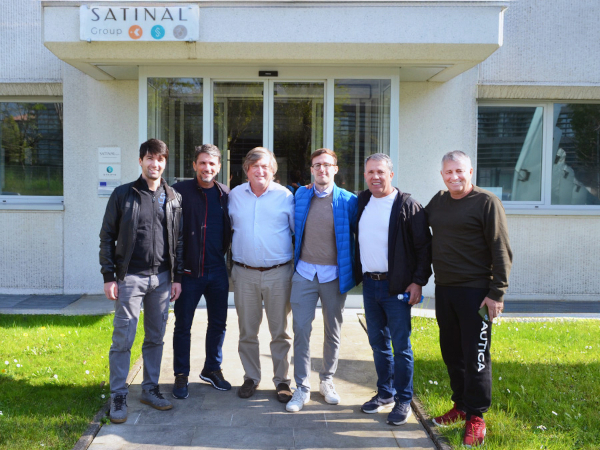
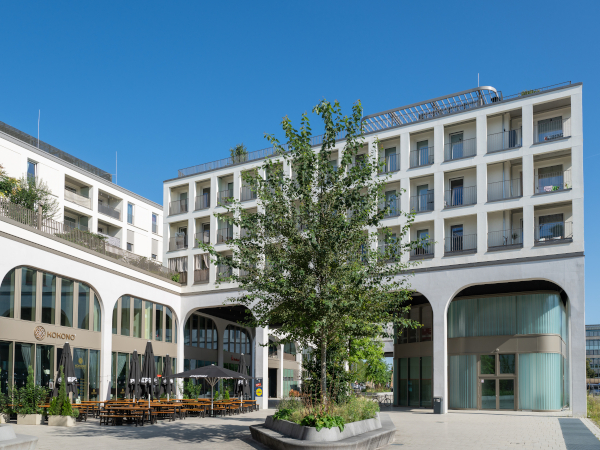
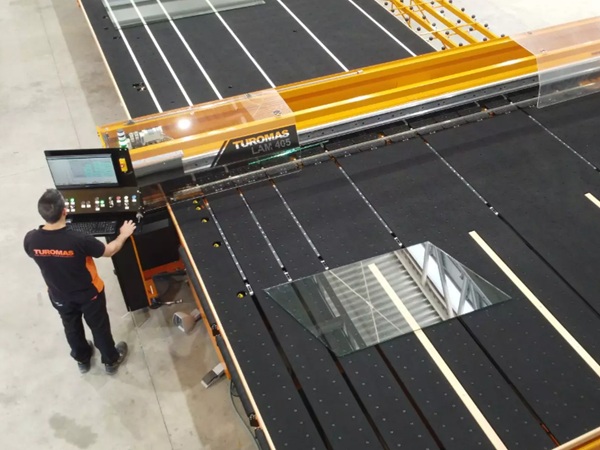

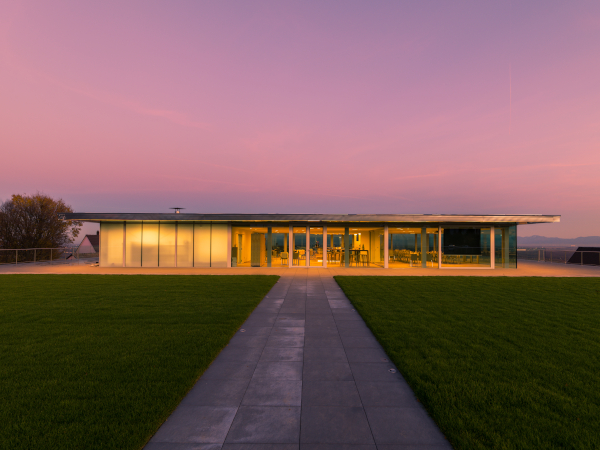


















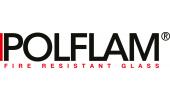









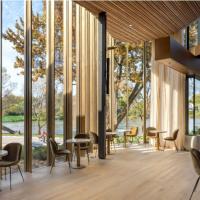
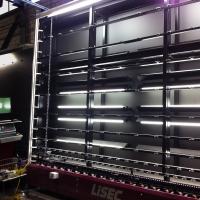
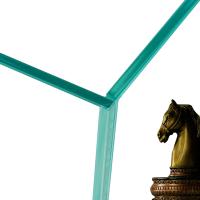

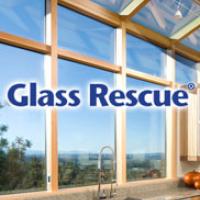
Add new comment